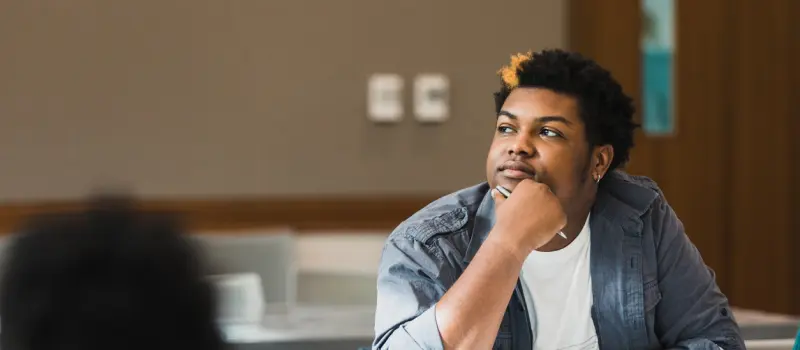
Table of Contents
Gen Z’s Mental Health Crisis & Collective Trauma

Written By: Ashley Laderer

Clinically Reviewed By: Dr. Don Gasparini
March 1, 2023
7 min.
The adolescents and young adults of Gen Z have already gone through plenty of collective trauma, and their mental health is struggling.
Learn more about our Clinical Review Process
Table of Contents
It’s no secret that every single generation has endured horrible trauma of one variety or another. But Generation Z is likely the most aware of (and most openly vocal about) the concept of trauma, its lasting mental health aspects, and mental health conditions in general.
Gen Z consists of people born between 1997 and 2013, meaning in 2023; they are the population of 11 to 26-year-olds. These individuals are at very different life stages––some are just entering middle school, while others are already established in the workforce. Regardless of age, there’s no question that Gen Z is facing collective trauma and a mental health crisis.
As Gen Zers have grown up, they’ve heard about disaster after disaster, whether that’s a global pandemic or yet another mass shooting. The traumatic ways of the world over the past several years have been inescapable for these “digital natives” –– 54% of whom spend at least four hours a day on social media. Any time they open an app, they’re opening themselves up to words, pictures, and videos about the horrors going on in the world.
Gen Z’s mental health is suffering –– and they aren’t afraid to talk about it.
Gen Z and mental health
Regarding the stats, it’s clear that Gen Z is struggling. A 2022 survey of Gen Z young adults (ages 19 through 24) found that 42% are diagnosed with a mental health condition. Of these people, 26% were diagnosed during the COVID-19 pandemic, which worsened mental health for many people of all ages. The four most common diagnoses among the survey respondents were anxiety, depression, attention-deficit/hyperactivity disorder (ADHD), and post-traumatic stress disorder. Sadly, one in four respondents said they had more bad than good days within a one-month period.
Furthermore, according to the American Psychological Association, 27% of Gen Zers say that their mental health is fair or poor, as opposed to 15% of millennials (born between 1981 and 1996) and 13% of Gen Xers (born between 1965 and 1980) who reported the same. A whopping 91% of Gen Z young adults say they’ve had one or more symptoms of stress, including:
- Feeling sad or depressed
- Having a lack of interest in activities
- Having a lack of energy
- Having a lack of motivation
The numbers don’t look great for Gen Z adolescents, either. Recent CDC data found the following among high school students:
- 29% experience poor mental health
- 42% have persistent feelings of sadness or hopelessness
- 22% have considered suicide
- 18% have made a suicide plan
- 10% have attempted suicide
Unfortunately, these numbers have been increasing as the years go on. For the same survey, during the 2011 school year, when millennials were in high school, 28% of the respondents reported feeling persistently sad or hopeless, as opposed to the present-day Gen Zers at 42% –– that’s a 14% increase.
Some high schoolers are at higher risk than others, including people in the following groups:
- LGBTQIA+ students
- Female students
- BIPOC (Black, Indigenous, people of color) students

Personalized mental health treatment for teens
Individual, group, and family sessions from the safety of home
For example, 45% of LGBTQIA+ students seriously contemplated suicide –– making them far more likely to experience suicidal ideation than their heterosexual classmates. Additionally, Black students were more likely than any other race to attempt suicide.
This is a huge deal. Not only does this mean Gen Z is hurting right now, but this can lead to complications and other struggles in the near and far future. Teens with poor mental health may experience issues at school, have trouble keeping grades up, and have difficulties with health. Mental health conditions in teens can lead to a higher risk of using drugs, taking part in violence, or engaging in unsafe sex, which can cause STIs or unintentional pregnancies.
Furthermore, early intervention is beneficial in cases of mental health conditions in adolescents. If someone doesn’t get the help they need when their condition is in its infancy, their symptoms may worsen without intervention. This can affect their mental and physical health as they enter adulthood, potentially decreasing their quality of life later on.
How Gen Z is destigmatizing mental health
If there’s one thing Gen Z isn’t afraid to do, it’s speaking up –– whether it’s about mental health or social causes like Black Lives Matter, women’s reproductive rights, or climate change. They are undeniably able to push complex topics and conversations to the forefront. They’re posting, they’re protesting –– and if they’re protesting, they’re posting about it.
With Gen Z’s increased prevalence of mental health struggles, stress, and trauma, there has also been an influx in the conversations surrounding mental health. Gen Z, more than any other generation, is willing to discuss mental health openly, whether to trusted loved ones and friends or on social media for the whole world to see.
An estimated 87% of Gen Z young adults feel comfortable talking about mental health in general with other people, and 63% feel comfortable opening up about their own mental health struggles. Furthermore, one in three Gen Z young adults have posted about their mental health on their social media profiles. Just open up TikTok and search for a mental health keyword of choice, and you’ll be flooded with tons of videos from Gen Zers ranging from “story times” to making relatable jokes using trending audios.

By being so vulnerable and open about their trauma or other conditions, Gen Z individuals are building an online community that might be more inclusive and supportive than ever for mental health, and normalizing and destigmatizing everything from dissociative disorders to psychiatric medications to inpatient hospitalization.
Beyond this, many are using their platforms to advocate for systemic changes and greater accessibility to resources and, ultimately, mental healthcare.
This starkly contrasts older generations who grew up with far more of a stigma surrounding mental health conditions and therapy, being told that mental health struggles were to be kept secret.
Whether Gen Z is honestly opening up about their battles offline or online, doing so is prompting meaningful discussions, making people feel less alone, and hopefully, inspiring people to reach out for help.
What’s causing Gen Z’s stress and collective trauma?
Perhaps the better question is, what isn’t stressing out Gen Z? In their short lives, the kids, teens, and young adults who make up Gen Z have (along with the rest) endured a lot. Their schooling experience has been entirely different than generations before, with a solid chunk of their “normal” school time taken away due to the pandemic. Even when returning to school, things weren’t (and still aren’t) necessarily back to normal. Between the pandemic and rising numbers of shootings, school doesn’t necessarily feel like a safe place for many Gen Zers. On top of this, they’ve been bombarded online with news stories about police brutality, environmental issues, social injustices…the list goes on and on.
Do you need more support with
your mental health?
Charlie Health can help.
Compared to older adults, surveys have found that Gen Z from age 15-21 are more stressed about many vital issues. They’re seeing it in the news, on social media, hearing about it from their friends, and experiencing it firsthand.
- 75% are stressed about mass shootings
- 62% are stressed about the rising suicide rates
- 58% are stressed about environmental concerns such as climate change and global warming
- 57% are stressed about immigrant or migrant families being separated or deported
- 53% are stressed about sexual harassment and assault
What the future holds for Gen Z
Hopefully, with the increase of readily-accessible information about mental health, the decrease of harmful stigmas, and greater accessibility of care, Gen Z will get the help they need.
Gen Z lives in an era where virtual care is widely accessible, even for mental health care. Telehealth is helping in many ways, one of which is providing more affordable care – especially when cost is such a serious barrier to care for many people of all ages, including Gen Z. Research surrounding virtual therapy for mental health, even for serious mental illness and substance use disorders, has been promising –– a beacon of hope in the healthcare space.
Telehealth offers care to people who may not have had it before, such as those who live in “healthcare deserts,” such as rural areas without access to adequate in-person care.
Older generations seem to be taking things more seriously and listening to the concerns of the younger generations. For example, employers are taking mental health benefits more seriously and providing employees with mental health days and access to virtual therapy providers.
Additionally, the government-funded 988 Suicide and Crisis Lifeline has provided people of all ages in the country with an easy-to-remember phone number to call (or text) during a mental health emergency.
Hopefully, by continuing to open up dialogues, Gen Z individuals will inspire themselves and others to actively work towards change, reach out for help when needed, and inspire younger generations to do the same.
How Charlie Health can help
If you or someone you know is struggling with their mental health, Charlie Health may be able to help. Founded during the COVID pandemic in 2020, Charlie Health is the largest virtual mental health provider for teens and young adults with serious mental health conditions. Charlie Health aims to end the youth mental health crisis by providing more equitable access to professional care. Our virtual intensive outpatient program provides personalized services for teens, young adults, and families dealing with a wide range of mental health conditions, ranging from anxiety to depression to PTSD and beyond. Whether you’re exploring treatment options for the first time or searching for extra support, Charlie Health provides individualized and evidence-based mental health care in a safe, supportive space.
Contact Charlie Health to learn more today.

